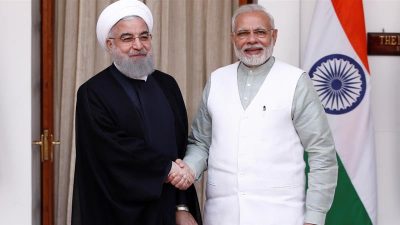Trump and Pakistan’s PM Khan Might Have Just Ruined Iran-India Relations

The American and Pakistani leaders independently took two very important and uncoordinated moves at almost the exact same time that might coincidentally have the same effect of ruining Iranian-Indian relations.
Iranian-Indian relations might be about to enter their worst-ever period in modern history as a result of two very important and uncoordinated moves undertaken at almost the exact same time by the American and Pakistani leaders. PM Khan just paid his first visit to Iran where he and his hosts announced that they’ll enter into a new era of anti-terrorist cooperation that geopolitical analyst Adam Garrie comprehensively analyzed in his recent piece on this breaking news event. The ball was indeed in Iran’s court to stop India’s anti-Pakistani Baloch terrorism like I wrote the other day, and to Tehran’s credit, its leadership finally understood this and decided to expand its military partnership with the global pivot state of Pakistan. This will greatly complicate India’s Hybrid War capabilities in clandestinely using Iranian territory to carry out terrorist attacks against Pakistan by proxy as it obsessively seeks to sabotage CPEC, meaning that PM Khan’s visit will have far-reaching and long-term geostrategic security consequences in the New Cold War.
In parallel with this, Trump decided that the US won’t renew its Iranian oil sanctions waivers and that Washington’s GCC partners of Saudi Arabia and the UAE will help the Islamic Republic’s energy customers replace their imports with Gulf resources instead. India was very vocal last year about its intent to defy the US’ unilateral sanctions against Iran, but as I wrote in my piece at the time about the “Indian Illusion“, all of this was just rhetoric to hide the fact that New Delhi was quietly implementing its new American patron’s will. Trump just put Modi on the spot, however, and it might augur negatively for the Indian leader during the ongoing month-long electoral process if he publicly capitulates to the US’ demands and replaces Iranian resources with Gulf ones like I suspected he’s been planning to do since late last year after his summit in Argentina with Saudi Crown Prince Mohammed Bin Salman. As such, this American move might also be yet another “bad cop” tactic against Modi to get more strategic concessions out of India.
It therefore wouldn’t be an exaggeration to say that Trump and PM Khan might have just ruined Iranian-Indian relations for good when considering the combined effect of their latest moves to that relationship. The Pakistani leader exposed India’s Hybrid War terrorist plot during his talks with the Iranian leadership which probably explains why the two neighboring nations decided to take their military cooperation with one another to the next level, while the American leader is forcing India to stop importing Iranian oil under the threat of potentially crippling “secondary sanctions” and to replace its resources with those from the Islamic Republic’s hated GCC foes. Although Iran and India still have shared strategic interests in the Chabahar Corridor and North-South Transport Corridor, the trust that formerly defined their relations is broken and their ties will never be the same. The end result is beneficial to the US and Pakistan for different reasons and might even interestingly be a tangential outcome of their recent diplomatic cooperation in Afghanistan.
*
Note to readers: please click the share buttons below. Forward this article to your email lists. Crosspost on your blog site, internet forums. etc.
This article was originally published on Eurasia Future.
Andrew Korybko is an American Moscow-based political analyst specializing in the relationship between the US strategy in Afro-Eurasia, China’s One Belt One Road global vision of New Silk Road connectivity, and Hybrid Warfare. He is a frequent contributor to Global Research.

